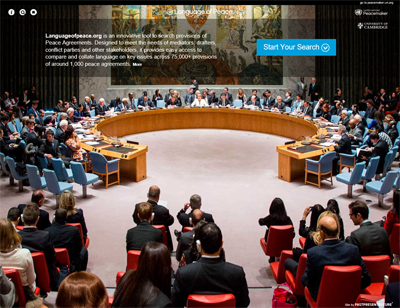 The research team for the Legal Tools for Peace-Making Project – Professor Marc Weller, Dr Tiina Pajuste, Dr Mark Retter, Jake Rylatt, and Andrea Varga – launched the Language of Peace database at the United Nations Headquarters in New York on 6 December 2016. The event was hosted by the Swiss Permanent Mission to the United Nations. It included a panel discussion on the importance of language in peace agreements with Under-Secretary-General for Political Affairs Jeffrey Feltman and former UN Special Representative to the Secretary-General Álvaro de Soto, moderated by the Director of Policy and Mediation Division at the Department of Political Affairs, Teresa Whitfield. Professor Marc Weller addressed the assembled dignitaries and guests on the value of the Language of Peace database for peace settlement, which was followed by a brief demonstration of its functionalities by Andrea Varga.
The research team for the Legal Tools for Peace-Making Project – Professor Marc Weller, Dr Tiina Pajuste, Dr Mark Retter, Jake Rylatt, and Andrea Varga – launched the Language of Peace database at the United Nations Headquarters in New York on 6 December 2016. The event was hosted by the Swiss Permanent Mission to the United Nations. It included a panel discussion on the importance of language in peace agreements with Under-Secretary-General for Political Affairs Jeffrey Feltman and former UN Special Representative to the Secretary-General Álvaro de Soto, moderated by the Director of Policy and Mediation Division at the Department of Political Affairs, Teresa Whitfield. Professor Marc Weller addressed the assembled dignitaries and guests on the value of the Language of Peace database for peace settlement, which was followed by a brief demonstration of its functionalities by Andrea Varga.
The Language of Peace database – developed by the research team of the Legal Tools for Peace-Making Project, with the collaboration of the UN Mediation Support Unit and the web developers at PASTPRESENTFUTURE – aims to eliminate the time-consuming and redundant background research which can burden settlement processes. Before this database, whenever mediators or negotiating parties wanted to identify past practice on a particular issue, they had no choice but to spend hours sifting through hundreds of agreements which may or may not have addressed the issue.
Building on the existing UN Peacemaker database, and designed with the needs of mediators, negotiating parties and researchers in mind, Language of Peace is an innovative search engine providing instant access to a rich collection of peace agreements concluded since World War II. Each provision of these agreements has been categorised according to 226 issues commonly faced in peace negotiations, grouped under 26 main headings. These include issues such as ceasefire monitoring, reconstruction and development, and political detainees. Users can browse issue areas, and further refine searches by a number of different criteria, such as type of conflict, country/territory, and date. In addition, the agreements have been transformed into a format which allows searches by specific words or phrases. Last but not least, Language of Peace enables users to bookmark and export the search results relevant to their research, aiding offline use and distribution. With these functionalities, Language of Peace aims to streamline the negotiation process, and thereby contribute to the success of peace-making around the world.
Language of Peace database: http://www.languageofpeace.org/

 Facebook
Facebook  X/Twitter
X/Twitter  Instagram
Instagram  YouTube
YouTube  Flickr
Flickr  LinkedIn
LinkedIn